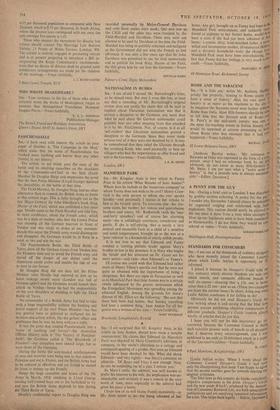PASSCHEN DA E LE
SIR,—I have read with interest the article in your paper of October 4, 'The Campaign in the Mud,' which states that the name of Passchendaele has 'evoked more loathing and horror than any other [battle] in our history.'
The article, to my mind, puts the onus of the battle and its resulting casualties on the shoulders of the Commander-in-Chief in the field (Field- Marshal Sir Douglas Haig) and emphasises the point that the then Prime Minister (Lloyd George) doubted the desirability of the battle at that time.
The Field-Marshal, Sir Douglas Haig, had no other alternative than to commit the British Army to battle at this critical stage. This is fully brought out in the late Major-General Sir John Davidson's book Haig, Master of the Field, which was published a few years ago. Nivelle came to the Field-Marshal and told him, in strict confidence, about the French artily, which was in a state of mutiny: also that the Crown Prince was massing all the German reserves in front of Verdun and was ready to strike at any moment: should this occur the French army would disintegrate and disappear, the,Germans would be in Paris in a week or two and win the war.
The Passchendaele Battle, the Third Battle of Ypres, drew all the German troops from Verdun into the Flanders mud and so saved the French army and staved off the danger of our defeat until the Americans could arrive and enable the tide of war to turn in our favour.
Sir Douglas Haig did not dare tell the Prime Minister what Nivelle had reported to him as he knew leakage would occur (London was full of German spies!) and the Germans would launch their attack on Verdun--hence he had the responsibility on his own shoulders of deciding to fight the Third Battle of Ypres.
No commander of a British Army has had to take such a huge responsibility without the backing and moral support of his own Prime Minister—nor has any general been so pilloried or maligned for his decision and action, which, like the gallant officer and gentleman that he was, he bore without a reply.
It was the press that created Passchendaele into a 'name of loathing and horror'—the Australian Official History calls it 'The Victory of Passchen- daele', the Germans called it 'The Bloodbath of Flanders'—our casualties were indeed large, but so were those of the Germans.
During the battle the sore-needed reinforcements of men and material were being sent to that sideshow Palestine and not to France, and the British Army had to be reduced in effectives and yet forced to extend its front to bolster up the French.
Hence the huge casualties and losses of the 5th Army in March, 1918, resulting in Lloyd George sending half-trained boys out to the battlefield to try and save the British Army depleted by him during the Third Battle of Ypres.
Nivelle's confidential report to Douglas Haig was recorded personally by Major-General Davidson and only three copies were made. One was sent to the CIGS and the other two were retained by the Field-Marshal and Davidson. These data were not allowed to be used by Davidson at the time the Field- Marshal was being so publicly criticised and maligned as the Government did not wish the French to feel affronted. It was only a few years ago that Sir John Davidson was permitted to use his vital memoranda and so publish his book Haig. Master of the. Field, the title given him by our foes the Germans.—Yours faithfully,


































 Previous page
Previous page